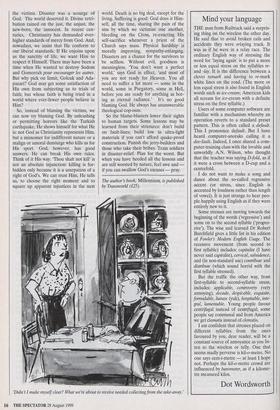Mind your language
THE man from Railtrack said a surpris- ing thing on the wireless the other day. He said that to avoid broken rails and accidents they were relaying track. It was as if he were in a relay race. The ordinary English way of stressing the word for 'laying again' is to put a more or less equal stress on the syllables re- and -lay. It is the difference between a clever remark and having to re-mark white lines on the road. (The more or less equal stress is also found in English words such as ice-cream; American kids all scream for ice-cream with a definite stress on the first syllable.) Users of some computer software are familiar with a mechanism whereby an operation reverts to a standard preset pattern. This is often called a default. This I pronounce default. But I have heard computer-anoraks calling it a dee-fault. Indeed, I once shared a com- puter-training class with the lovable and unworldly A.N. Wilson, who thought that the teacher was saying D-fold, as if it were a cross between a D-cup and a centrefold.
I do not want to make a song and dance about the so-called regressive accent (or stress, since English is accented by loudness rather than length of vowel). It is just strange to hear peo- ple happily using English as if they were entirely new to it.
Some stresses are moving towards the beginning of the words (`regressive') and some on to the second syllable (`progres- sive'). The wise and learned Dr Robert Burchfield gives a little list in his edition of Fowler's Modem English Usage. The recessive movement (from second to first syllable) includes: capitalist (I have never said capitalist), cervical, subsidence, and (in non-standard use) contribute and distribute (which sound horrid with the first syllable stressed).
But the traffic the other way, from first-syllable to second-syllable stress, includes: applicable, controversy (very annoying), decade, despicable, exquisite, formidable, harass (yuk), hospitable, inte- gral, lamentable. Young people favour centrifugal instead of centnfugal; some people say communal and from America we get clematis instead of clematis.
I am confident that stresses placed on different syllables from the ones favoured by you, dear reader, will be a constant source of annoyance as you lis- ten to the wireless or telly. One that seems madly perverse is kil-o-metre. No one says cent-i-metre — at least I hope not. Perhaps the kil-o-metre crowd are influenced by barometer, as if a kilome- tre measured kilos.
Dot Wordsworth


























































 Previous page
Previous page